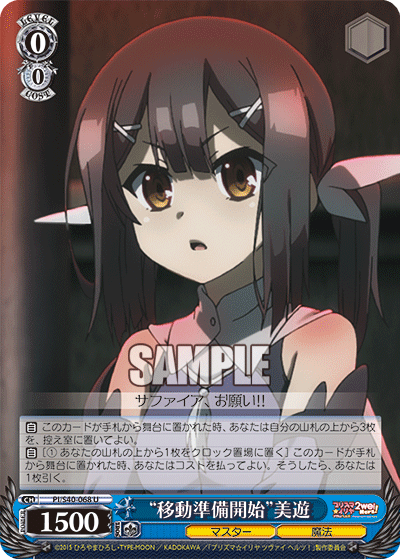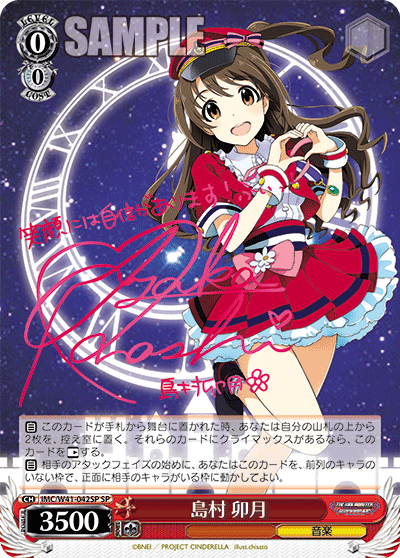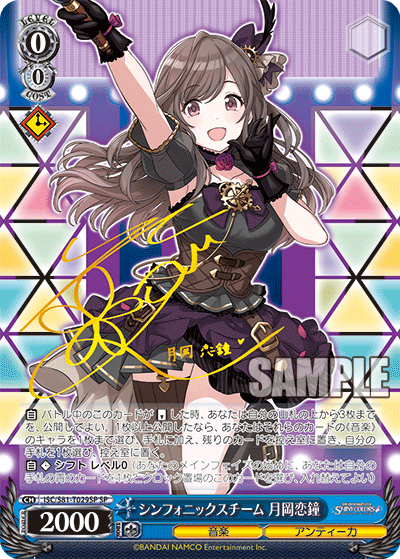I’ll admit this myself as well, but I often neglect the importance of adding cards that mill to my decks. Milling seems like such an underwhelming effect when there are cards that filter more than once or grab targets I want. Often, I just leave effects like brainstorm or Amagi to handle all the mill, but from experience, that just isn’t enough.
The importance of mill in Weiss is essential because it pushes you closer to refresh, thus ensuring that you always have a ready set of climaxes in your deck present fir cancelling. Having the option to mill upon request is a very powerful ability that can swing your deck state in your favor. Furthermore, given how the game works, there are moments where you may be out of most of your climaxes or all in the early game, making it essential for you to enter a new deck or you’ll see yourself eating a large chunk of damage during your opponent’s next turn.
Mill itself isn’t exactly a single effect. Mill is a keyword that means to place cards from the top of your deck into the waiting room. Many cards can accomplish this, and some are far more effective than others. The key is to be in control of your mills, to ensure that you are milling the amount you want and at the right time. You also want to make sure that you are potentially milling targets into the waiting room that you would like as well for any of those waiting room effects.



MK/S33-P07PR “音楽家”エリー (center)
RW/W15-127PR “風祭学院高校”静流 (right)
Mill has changed over the years with mill being attached to other beneficial effects. The waiting room has become the main source of card advantage with most decks looking there to salvage cards. Filling up the waiting room early usually means a larger pool of resources to work with. The simplest form of mill is to run cards like the above that drop a large number of cards into your waiting room from deck. Usually, if the number of cards is quite large, and it’s on a costless effect, you have little to no way to control how many are milled. You have to send the exact amount listed on the card, no more, no less.
Don’t get me wrong. It may sound like these types of cards above are bad, but they are far from it. Sometimes you just need cards that mill a large number of cards, and if that’s the case, these types of cards above are perfect for the situation.



IMC/W41-042SP-SP 島村 卯月 (center)
LSS/WE27-61PR ミニ果南 (right)
The second type of mill in another subcategory is conditional mills. These cards usually forcibly mill on play to fulfill some sort of effect. If certain cards are milled, the card will grand another ability. Due to the random nature of these cards and the forced mill requirements, they do not seem quite appetizing at first glance. However, some of the conditional effects can be very powerful as is the case of Mai providing a cheap hand fix without the use of stock. Other conditions such as Uzuki force cards to come in rested but offer a powerful opposing ability in exchange (Uzuki is a chaser runner).



ISC/S81-T029SP-SP シンフォニックスチーム 月岡恋鐘 (center)
APO/S53-057bU ふたつのタバコ (right)
The last type of mill that is commonly used is the filter mills. Effects such as Akatsuki or Rize are common and help with ensuring that the deck is milled while fixing your hand. Timings for these cards can be all over the place as are those for conditional mills. However, the key feature to note for these cards is that they can be potentially limited in scope for their abilities, usually limiting their effects to the cards revealed by their abilities. Cigarettes is a rather unique profile that mills your deck and then provides you an effect based on the cards you milled. Unlike conditional mill, Cigarettes almost always ensures you get its effect off, even if the cards in your waiting room aren’t the best for its ability.


Brainstorms and Amagi are rather unique profiles that are relatively consistent mill options in a game. Both profiles commonly mill four unless specified otherwise. Brainstorms can supply a variety of effects depending on their text boxes and are commonly used for additional hand generation for a cheap cost. Amagi profiles only proc on the use of a climax, but depending on the deck they are in, this can be very common, allowing a constant source of hand generation.
These are just examples of various cards that mill the deck in some capacity or another. Once again, the options you take should cater to the deck that you build. Additionally, that’s not to say that some mill options are better than others. At the end of the day, you have to mix and match to find the options that fit your playstyle and deck build. Sometimes instead of filtering, you just want to send a large number of cards from deck to waiting room. Conditional mill effects might be genuinely good for additional side effects or their conditional filter ability if you do manage to fulfill their condition. See what fits for you.